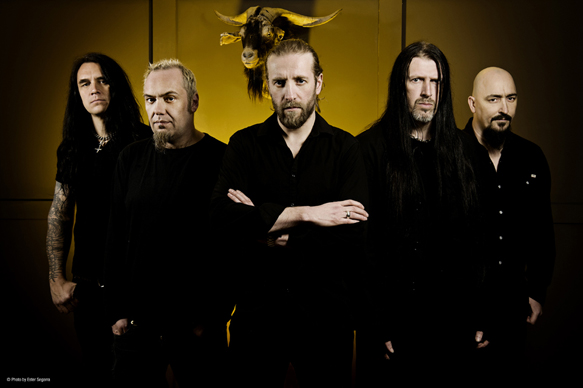
Over the years bands have come and gone but few have the diversity and impact as British metal band Paradise Lost. Forming back in 1988 as a death metal with doomish elements, Paradise Lost soon became a pioneer in the scene with their unique approach. They are now known as the founding fathers of a broader genre known as gothic metal. Cited as a respected influence to many successful bands, Paradise Lost has stayed true to their music providing listeners with 13 distinct studio albums over the years. Now celebrating their 25th anniversary, the band continues to tour the world, create new music, and push the boundaries of their musical visions. Recently we sat down with founding guitarist and songwriter Greg Mackintosh for an in-depth retrospective of the past 25 years of Paradise Lost, love for music, horror movies, and much more.
CrypticRock.com – Paradise Lost just celebrated its 25th anniversary as a band. Since the band’s inception back in 1988, the band has progressed over the years from the doom metal sounds of the early material to what we now know as gothic metal. Tell me a bit about the transformation of Paradise Lost and being the key founders of this genre?
Greg Mackintosh – When we first started out we were playing with a lot of bands like Napalm Death, Extreme Noise Terror, and Carcass. We were into all that stuff, but we were also really into doom metal. Stuff like Pentagram, Black Sabbath, and Candlemass. We kind of did this whole death/doom thing. Every time we’d play with these bands there was just an audience full of people saying play fast stuff. Being stubborn Northern Englanders we didn’t take orders. On the 2nd album, Gothic (1991), we decided to bring in some early gothic rock and maybe some classical elements. That was the album really, I would classify it as gothic metal, if you want to use that term. We actually coined the term earlier; in an interview probably around 1989 when we first used the term gothic metal. That is where everyone picked it up from. It was really just a sound bite, it wasn’t meant to be a big thing, and it has turned into a genre on its own. We could be thought of as contributors of who first coined the phrase, but I don’t think we have much in common with what people call gothic metal today. If you look at a kid on the street and ask them what they think is gothic metal they will probably say Marilyn Manson or Evanescence, we don’t have anything in common with that kind of stuff.
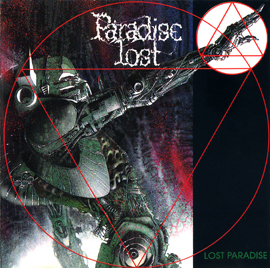

CrypticRock.com – It’s very true what people consider gothic metal now; Paradise Lost has not much to do with it. Now you look back at the Icon record as a turning point in your sound for Paradise Lost. The album was followed by perhaps one of the band’s cornerstone albums Draconian Times. Looking back on that record 18 years later what do you think the key to the magic behind Draconian Times (1995) was?
Greg Mackintosh – It is one of those unknown quantities I think. I think we found a sound just before the Icon (1993) album with a song we did call “As I Die”, which was not on the original press of Shades of God (1992). That song was kind of the song that guided us in that direction. So we found our sound on the Icon album, but it was more primitive than the Draconian Times album. The Icon album kind of just took off and we did lots of touring. We did our first tour of America with Sepultura. We didn’t have any time off and we were writing on the road. I kind of think of Draconian Times was Icon Part 2, but much more polished because we had been touring so much with that style of music and kind of perfected it on the road. For me, it’s parts 1 and 2, Icon and Draconian Times. Icon is where we found the sound and Draconian Times is where we perfected it.
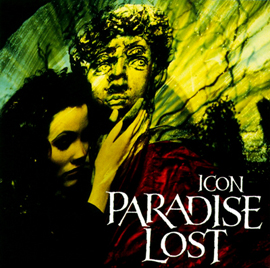
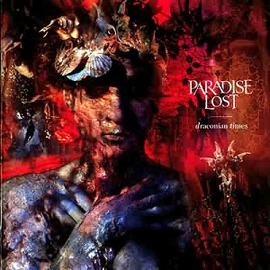
CrypticRock.com – That makes perfect sense. The one thing about Paradise Lost that makes the band so interesting is your ability to release a different-sounding record each time you put out new material. How important is it to you and the band to continue to push those boundaries?
Greg Mackintosh – We wouldn’t do it just for the sake of it. We wouldn’t just say we have to change the sound now because it’s expected of us or something like that. That in itself creates its own problems. To me, an album is a snapshot of where you were during that point in your life. That is why I can never really look forward to things. People ask, “What is your next album going to be like?” I don’t know, ask me 6 months or a year, because it all depends on how you feel at that moment in time. We never plan to do albums differently every time; it just comes out and needs to feel fulfilled in our career. For me, it wouldn’t be fulfilling to have 25 years of doing the same record over and over again. I understand the metal community kind of likes its repetitiveness. I can be the same, I like certain bands that I like to stay the same, but you can understand why you’d want to diversify just for your own enjoyment. The whole point of being in a band for me is to enjoy what I am doing. It certainly isn’t for huge paychecks, chicks, or covers of magazines; that is for the glam rockers of the world and the rappers (laughs). Ours is for the pure enjoyment of it all. If enjoying it means diversity, then that is what we have to do.
CrypticRock.com – Of course, you want to have that progression as an artist. You have to enjoy what you are doing. If you just stay in one place for your entire career it has to get boring I imagine?
Greg Mackintosh – Yes. I have played with a lot of bands over the years that play the same album pretty much over and over again. They don’t even like the style of music they are playing. For me, that is kind of like torture. Why would you do that? It’s like working on a production line or something, which defeats the objective of doing this for a living. I am very fortunate to be doing this for a living. I never take that for granted and enjoy every single minute of it. To do that you have to please yourself, you can’t try and second guess what other people think about you. It just waters down your enjoyment and the end result of what you record.
CrypticRock.com – That is very true. I am a firm believer in you always have to do what you feel is true to your artistic visions and the rest will follow. That is what makes the best art and people will appreciate it.
Greg Mackintosh – Yes, sometimes it works and sometimes it doesn’t. That is why art is so subjective. Some records didn’t catch on until years later. Even the Gothic album, I had to personally go to Peaceville Records to convince them to release it, because they didn’t understand what it was. It wasn’t until 9 years later that people went oh this is actually a really cool record. There are a lot of records like that in our career. The Host (1999) album, gets sort of shtick and I can understand that. I knew people would be upset doing this u-turn in the middle of our career. These days you get a whole new generation of people who say I really love that record. It took 10 years for anyone to kind of get it.

CrypticRock.com – Sometimes it takes a long time for things to sink in. As part of the celebration of 25 years together as a band, you are releasing a new compilation entitled Tragic Illusions 25. The album contains a collection of previously released rarities, plus the new track “Loneliness Remains” and newly recorded “Gothic 2013” and “Our Saviour 2013”. For hardcore Paradise Lost fans, this is a must-have. What can fans expect from the anniversary compilation except for the music itself?
Greg Mackintosh – Yes, that’s a good question. The initial idea came from Century Media. A guy that we know said you should do something for your 25th anniversary, so we asked what? He said well you have a lot of tracks that are on Japanese versions or B-sides that not everyone even knows about and they were strong enough to be on the records. It was their idea to put together the compilation and we said it sounded like a good idea to put everything together in one place for the collectors. We wanted to make it a little more than that. We wanted to make it so that it kind of tells the story of the band as well. It was our idea to re-record the really early tracks because there are a lot of people who became fans of ours who have no idea where our roots lie and where we came from. We wanted to kind of school them on that. We felt if we put the original versions on the album, they have their charm because they are of that time, but it’s the charm of that time and it wouldn’t translate to today to someone who maybe hasn’t heard them before. We felt it was important to re-record these tracks to serve them to newer fans who maybe didn’t understand what we did in the early days. We weren’t trying to reinvent the wheel or make anything better than it was in the early days. It was just to make it more palatable and also something for us to reminisce about.
We also wanted to put a new track on it, bridging the old and the new. Then we got the artist who did the artwork for Tragic Idol (2012) because we loved what he did on that record. What we wanted to do was some really eye-catching artwork that kind of had elements of a lot of records that we’ve done over the years. The artwork itself has little elements within it. It’s kind of a Where’s Waldo of Paradise Lost cover with little bits and things that were on certain covers over the years that we incorporated into the artwork. I think he’s made a fantastic package that he put together. Not everyone’s going to be interested in that. I understand there are people in the modern generation who just download the tracks and don’t care about the artwork. I grew up in a period where I bought picture discs of albums, 12 inches, and 10 inches. To me, the whole package is very important, the artwork, the photography, and the lyrics. The whole thing to me is a package and I am very proud of how it turned out. I think everyone did a really good job putting it together.

CrypticRock.com – The whole package is very important. Something like this is for the hardcore fans. It’s going to be for the collectors and that is what makes it so special. It will be something great to have.
Greg Mackintosh – Yes absolutely. We are not trying to get new fans with it. It’s definitely a collector’s piece for fans who don’t necessarily know certain tracks exist, or maybe just wanted them all in one place at one time. We wanted to make it a worthwhile package and that is why we did the re-records, new track, and all new artwork. We wanted to make it something that was worthy of a 25 year anniversary.
CrypticRock.com – What is interesting about this compilation is the re-recording of classic Paradise Lost tracks “Gothic” and “Our Saviour”. What was it like going into the studio and re-arranging these tracks all these years later and having Nick Holmes play with that older vocal style again?
Greg Mackintosh – Yes, there was a lot of moaning going on from Nick especially (laughs). Like you said he doesn’t use that vocal style anymore. It was a bit kind of messing around in the studio until we were happy with the style that did it justice. At the same time, it was a lot of fun, it was a hell of a lot of fun. It was kind of like visiting an old friend, with songs we had not played in a long time. With Adrian Erlandsson been part of Paradise Lost now for the past 4-5 years on drums, he was a fan of the band as a teenager, and “Our Savior” was his favorite track. That is basically why we chose that track to re-record; he wanted to play on it. It was cool to look back on; it was like looking through an old photo album.
CrypticRock.com – That’s pretty cool and had to be amazing for Adrian playing on a track he loved growing up.
Greg Mackintosh – Yea, which is literally why we choose “Our Savior”. We couldn’t decide between what songs to choose, so we decided since Adrian always mentioned this track we’d do it for him.
CrypticRock.com – That is pretty cool. Paradise Lost has achieved a great deal of success in the European market and is legendary in the metal scene there. With a dedicated passionate fan base in North America, it just seems the band doesn’t get the recognition they deserve here in the States. Tell me why do you think the band is so underrated here in the USA?
Greg Mackintosh – I think there are a couple of reasons for that. One is our problem. We came to tour there in 1993 with Morbid Angel and Kreator, right before the Shades of God album came out in America. We had such a bad time on that tour that we said we didn’t want to go back there for a long time. We kind of shot ourselves in the foot a little bit. If we had toured North America during Icon and Draconian Times things might have been different now. I don’t have regrets because I think the only reason we are here now is because everything that has happened in our history has happened for a reason. That would be a big reason why we were overlooked at the time because we actually made a decision not to tour there. I think another reason is we ultimately went on to influence other bands that went on to be popular in America. So the American audience sort of skipped the need for us because it had already gotten to our “Children” if you know what I mean. They already skipped that generation. So it’s partly our fault, we take responsibility for that. There was just no awareness then, but the people that were into us at the time were still aware and we had a hardcore following there. Hindsight, it’s a very interesting thing and yes it would probably been better to tour there during Icon and Draconian Times. I have no regrets though.
CrypticRock.com – The band has had a great career, you can’t have regrets. It’s interesting you mentioned how you ultimately have gone on to influence other bands that have become popular in the USA. For example, in 2012 Paradise Lost came to tour North America with Katatonia and Devin Townsend. You opened for Katatonia and if you spoke with people at the shows, honestly, they had no idea who Paradise Lost was. More aware people had to say Paradise Lost is part of the reason Katatonia is here.
Greg Mackintosh – Yes, Katatonia has said quite often, that we are part of the reason they formed a band. They really weren’t happy on that tour that we were opening for them. We just said look it is what it is, we are friends of yours and we are happy to do it. It is what it is, unfortunately when you are touring the billing comes down to a popularity contest. It’s not about who started what or who influenced who. We have a lot of respect for Katatonia. They started off being very influenced by us and went on to do their own thing. We have great respect for them. I have no problem with it at all. I can understand how someone who knows the whole history of the genre can find it a little strange.
CrypticRock.com – Yes of course and ultimately the most important part is fans here in North America had the chance to see Paradise Lost. You have a very distinct guitar sound, dark and melodic yet heavy. What are some of your musical influences?
Greg Mackintosh – Growing up playing guitar I never really had any guitar heroes. I’d had songwriting heroes I suppose and liked the way songs were composed. I’d kind of copy vocal harmony lines on guitar and play along with them. To me I guess my guitar style came out of a mixture of being into different styles of music and actually playing the guitar like a vocalist would sing a song. So every time the vocal line and guitar line comes in it actually takes on what the vocal line does, rather than being apart where someone says here comes the guitar solo. I guess it’s just being unconventional that led to me having a certain guitar style. It certainly wasn’t intentional. I never sat down and thought I wanted to play a certain style of guitar. It was because I really didn’t look up to the traditional way of playing guitar.
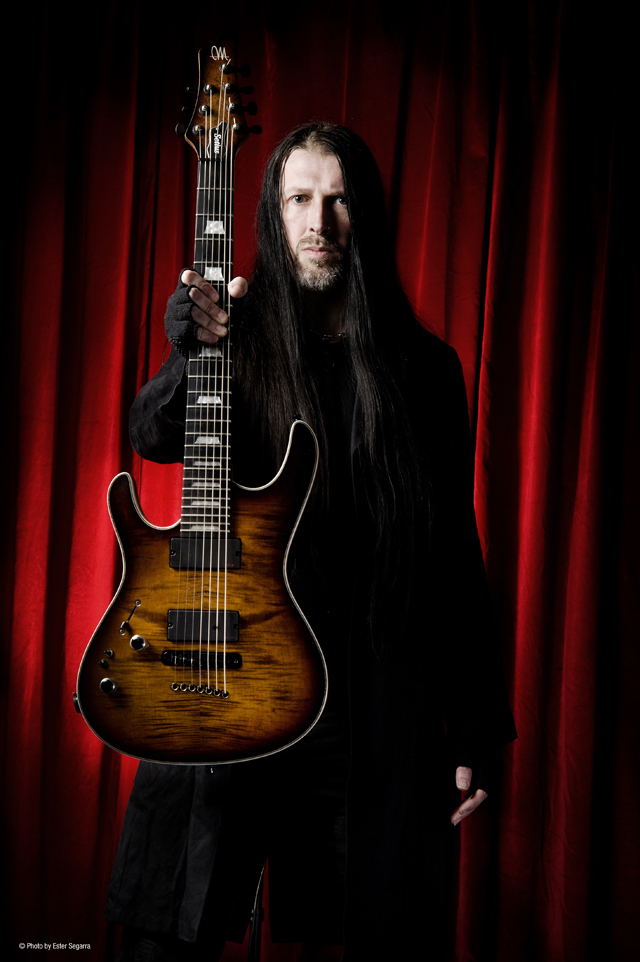
CrypticRock.com – Yes and obviously you have had influence from many different genres. What are some of your favorite bands?
Greg Mackintosh – I definitely like Tony Iommi a lot. I like The Cult, Sisters of Mercy, Siouxsie and the Banshees, Johnny Marr, and The Smiths. All that stuff mixed in with metal music and rock music as well. I like The Edge, Hendrix, and a lot of classic stuff as well. You kind of mix that all together I guess and my style makes more sense.
CrypticRock.com – Yes it does make sense. It also creates the sound that makes Paradise Lost. All those influences mixed up make a great deal of what the band’s sound is.
Greg Mackintosh – Yes and some influences are more prevalent than others at certain points in our career, but I think they are all there to some degree at some point.
CrypticRock.com – Yes like the Host record which was much different.
Greg Mackintosh – Yes it was a lot of things, some people called it a Depeche Mode record. Some people called it The Cure record. People said it was too gothic, too this, or too that. You know I don’t really care. The whole point of doing a record like that is you’re not actually worrying about the outside world. You are doing whatever floats your boat at the time. We wrapped ourselves in our own little bubble and we knew it would be kind of commercial suicide for us in the metal genre. We obviously didn’t care. We were just trying to make ourselves happy at that moment in time. Yes, it had repercussions, but again I don’t regret it. I stand by it and think it’s an important part of our history of putting us where we are now.
CrypticRock.com – Yes, I think a lot of people have the misconception that there are no guitars on the Host record. There are guitars; they are just very tucked under.
Greg Mackintosh – It’s not only that, one of the things I was trying to do at the time was trying to blur the line between electronic and rock music. For instance, I’d start out with a keyboard, putting it through an old Boss distortion pedal, and I put the guitar through the same pedal. You didn’t necessarily know what was guitar and what was keyboard at any one point. That was half the idea within the album. I am not sure if it translated too well, and not sure if a lot of people got it, but that was the point of it at the time.
CrypticRock.com – It is a very interesting concept. My last question for you is regarding films. Crypticrock.com is a rock/metal and horror news site so we like to focus on all genres. Are you a fan of horror films and if so what are some of your favorite horror films?
Greg Mackintosh – I am absolutely a huge fan of horror films. I must watch 5-6 new horror movies every week, as well as all the classics I own. I have favorites in the genre and I also have stuff that I have watched recently that is underrated or not in the limelight. I also go to a lot of horror film festivals. I am very involved in stuff like that. I think there have been some great films of late. One is called Harold’s Going Stiff (2011). I have always liked different takes on the zombie thing. This one kind of addresses dementia and crosses old age with the zombie thing. There is also one recently called Before Dawn (2012) that I really liked. It is set in the area where I live, which was quite interesting. There was also this 3 part series on the BBC called In The Flesh (2013) that was fantastic. Those are some of the indie ones. The mainstream ones over the years I like are The Exorcist (1973) and The Others(2001).


CrypticRock.com – I love the older horror films. One recent one that was done well was The Woman in Black (2012) remake. It was the first Hammer film done in a long time.
Greg Mackintosh – Yes, I saw it and thought it was great. I actually love the original as well. It’s actually a TV film many years ago in England. I remember seeing it when I was young. I know a lot of my friends who are sort of real horror snobs didn’t like the remake. If you take it as its own film I think it’s great. It’s like the film Let Me In (2010), which was a remake of the Swedish film Let The Right One In (2008). Some people don’t like the new or the old one. I like them both for different reasons. I think when it comes to remakes you have to step away and kind of look at the director’s reasons for making a remake. Was it meant to be faithful or was it meant to cover something else not covered in the other version? I can stand back and understand these things when watching these films. I have a great love for the horror genre.
CrypticRock.com – Yes, that is a good way to look at it. What is your take on the bulk of the remakes? Especially like the Nightmare On Elm Street (2010), and Friday The 13th (2009) remakes. In my opinion, a lot of them are made for financial gain. What is your take on it?
Greg Mackintosh – I agree with you on the whole, but there have been some that took me by surprise. For example, the Dawn Of The Dead (2004) remake, was a great film. It was not the same as the original, it’s not trying to be a massive social commentary like the original, but it was a good film. I remember thinking this of The Texas Chainsaw Massacre: The Beginning (2006). I think there are certain instances of remakes where they get it right. I kind of agree that it’s hard to find a good remake.
CrypticRock.com – Yes, what is your opinion on the new Carrie (2013) remake?
Greg Mackintosh – When I saw who was involved I hoped, but after seeing the trailer I was not expecting much I must say. I had really high hopes for the Evil Dead (2013) remake because who was involved with that one? I have to say I was pretty disappointed.
CrypticRock.com – Yes I didn’t go into that with any expectations, but I left the film not very happy at all with it. It appeared to be excessively gory for no reason.
Greg Mackintosh – Yes, as a film on its own it had all elements of stuff I like about horror films. I am glad films like that still exist and people still want to do them. It just completely missed the point of the original. It just completely bypassed everything that was likable about the original. There was nothing scary about it, isn’t that what horror is supposed to be? It’s just not scary.
Check out Paradise Lost at www.paradiselost.co.uk, facebook, & twitter
Feature photos at beginning of article photo credit Ester Segarra
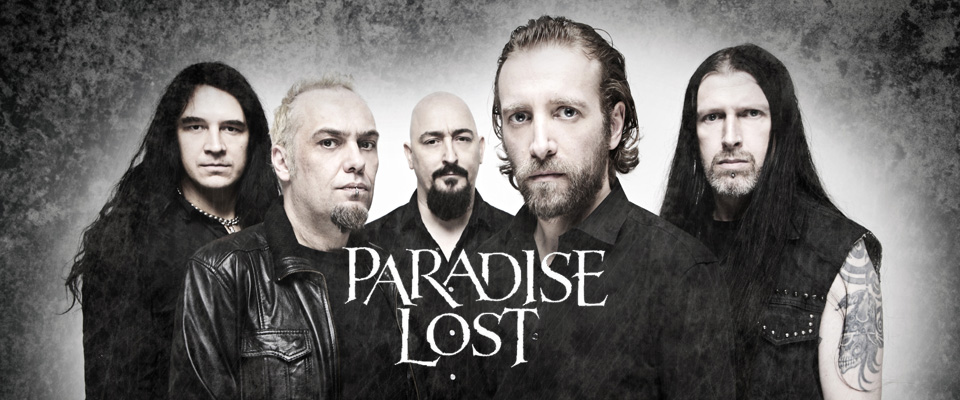
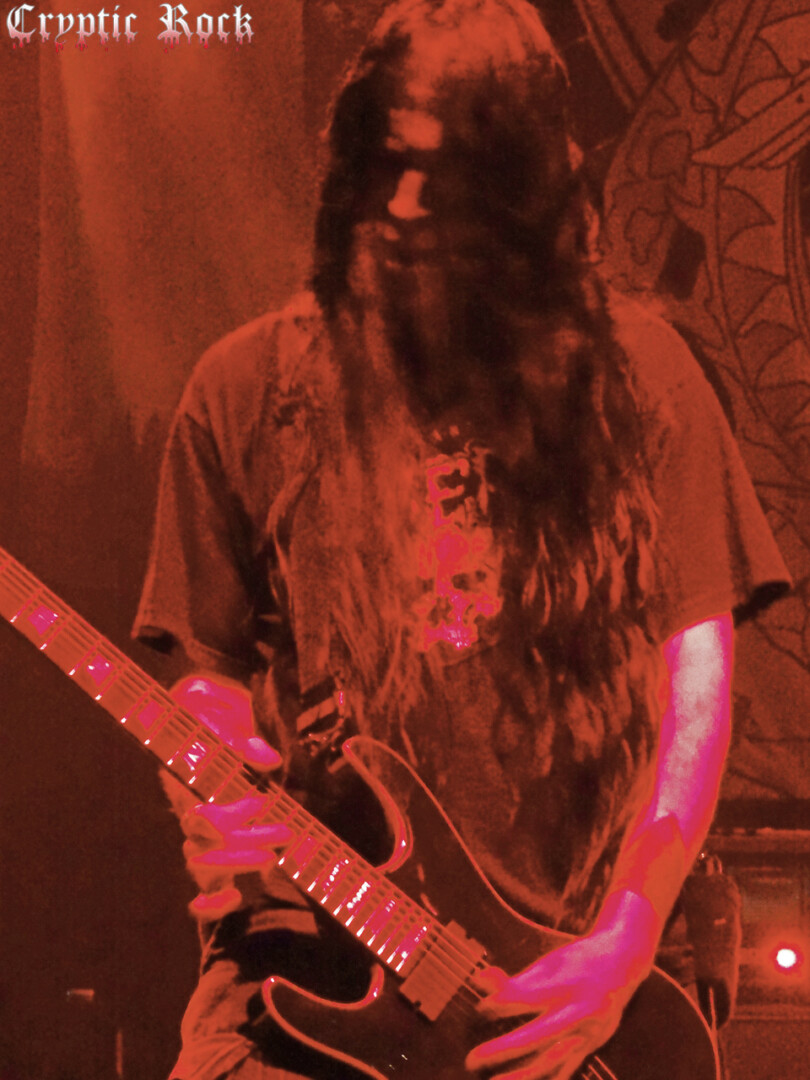
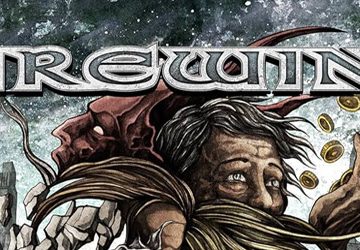
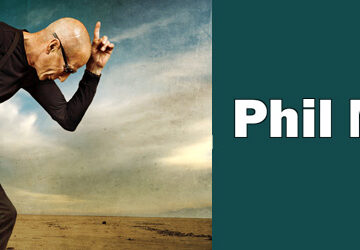


No comment